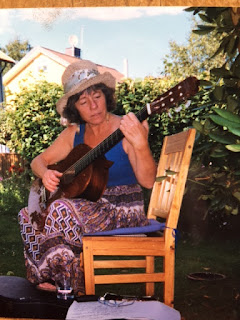Yesterday,
after more than a decade of not playing my guitar, I had a lesson from my
former teacher, Ray Reussner, who studied with Segovia in Spain and for many years thereafter. He led me to my
familiar place by the window in the living room of his house, where he had set up two chairs with footstools
and a music stand. Once again there was the familiar talk about fingernails, the stories
about Segovia, the correction of technique, the beautiful sound of Ray Reussner
on his guitar. I have at last returned.
 |
| Ray Reussner playing at Mission San Antonio in California |
The
beginning of what I had returned to was almost twenty years ago when, realizing
at last that I would never have a piano, I thought maybe a classical guitar
would give me the same pleasure. The glow I felt when I walked out of the music
store with a guitar in my hand promised as much
I did enjoy
it, but I became dissatisfied with my first teacher. There was something more I
wanted from the guitar, but I didn't know what it was.
When one of
my students at Rogue Community College learned I played a classical guitar, he told
me his father was friends with a guitarist in Williams who had been a student
of Segovia. What a golden opportunity if I could take lessons from him! I asked
for the name and phone number, but my student demurred. The man wasn't giving
lessons or playing concerts or having anything more to do with the guitar than
playing in his own home. I begged and pleaded and did everything but guarantee my
student an A in the class if he would put me in touch with this guitarist until
finally he got permission from Ray to give me his phone number.
I called Ray at once and explained that I was new to
the guitar and would like to take lessons from him.
"No,
no. I'm not doing that any more," he said, but then he relented – a bit.
"Come on over and bring your guitar, and we'll see," he said.
Was I going
to have to audition for lessons from
Ray Reussner? I worked up a piece to play for him, then put my guitar in my car
and followed Ray's directions to his house.
He greeted
me at the door and led me through the vestibule and dining room into the living
room of his beautiful house, which, I learned later, he had built himself. The
footstool and music stand were ready. We sat down, and I played my piece.
When I
finished, he said, dismissively, "You play just like everyone else," and
he took my guitar from me and played Mendelssohn's "Song without Words" on it.
I almost
fell out of my chair. This was it! This
was what classical guitar was supposed to sound like. This was the way I wanted
to play. I was ready to do anything to get Ray to agree to give me lessons.
I think it
was that reaction that did the trick: Ray accepted me as a guitar student. For
years I came to his house for lessons. We would sit by the window in the living
room and play guitars. He would tell Segovia stories. We would compare
fingernails. He would play for me the latest piece he was working on. Taking
lessons from Ray was like having a private Ray Reussner mini-concert at every
lesson.
I was crazy
about my guitar. I practiced religiously. Unwilling to go three weeks without
practicing, I carried my guitar to Sweden with me.
I thought I would always be playing the guitar.
Even when I started a Ph.D. program at the University of
Oregon, I thought that, of course, I would keep playing. Soon enough, though, I
realized that I couldn't be doing everything I had always done in my always
full life and just add graduate school on top of it. Some things would have to
be left behind. The guitar was one.
Once I put the
guitar down, it was difficult to pick it up again after graduation. I knew how badly I would play. I knew my
fingers were out of practice, that I had forgotten everything Ray had taught
me. I knew I wouldn't be able to start again where I had left off, that I would
have to go back to beginner's pieces. My fingers had become unwilling, and my
pleasure stifled.
Then at a gathering some time before
Christmas last year, when people started playing music together, my son put a
guitar in my hand. At first I couldn't remember a single chord. Then my fingers
stumbled onto one or two. Other people left the room until only my son and I
were playing together. As I played with him, the old pleasure began stirring in
me. My New Year's resolution was to start playing my guitar again.
That's all
it took. Once I wrapped my arms around my beautiful guitar, the one Ray had
made and that I had bought years ago,
once I put my old music on my music stand
(the one my son had made for me),
once I heard again the beautiful tones of my
guitar, I knew I had returned. The musicianship is rusty, but I have the best
guitar teacher in the country, and I love my guitar and the music within it.
Gradually, as before, Ray Reussner will help me coax that beauty into the
world.








